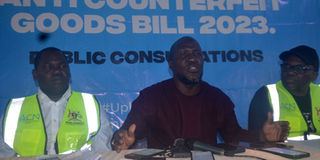Parliament tasked to fast-track Anti-Counterfeit Bill

Soroti West Member of Parliament Jonathan Ebwalu (left) Bugiri Member of Parliament Asuman Basalirwa (centre) and the Chairperson of Anti-counterfeit Network in Africa, Mr Fred Muwema, during a consultative meeting in Bugiri District on Wednesday. PHOTO | TAUSI NAKATO
What you need to know:
- During consultative meetings in these two areas on Wednesday, the residents said the Bill would help prohibit the manufacturing and selling of counterfeit goods.
Busoga Sub-region and Soroti City residents have asked Parliament to fast-track the passing into law of the Anti-counterfeit Goods and Services Bill, 2023. The proposed law is aimed at eliminating substandard products on the market.
During consultative meetings in these two areas on Wednesday, the residents said the Bill would help prohibit the manufacturing and selling of counterfeit goods.
The proposed law was introduced by the Bugiri Municipality Member of Parliament, Mr Asuman Basalirwa, and supported by the Soroti West Member of Parliament, Mr Jonathan Ebwalu.
The Bill, among others, also seeks to impose tougher rules to control the sale, manufacture, and importation of counterfeit goods and services and public consultations are underway.
Mr Basalirwa said those found guilty will be fined five times the value of the prevailing retail prices of genuine products or face 10 years in jail.
Residents who attended a consultative meeting in Bugiri Municipality narrated how they become victims of fake products yet the existing laws have weak punishments.
Mr Basalirwa revealed how his father is currently battling cancer because of counterfeit goods.
“Cancer is directly related to the use of counterfeit drugs, foods, and other issues. If we don’t address the issue of counterfeiting, we are not likely to win the battle against cancer. My dad is one of the victims,” he said.
Mr Basalirwa said many Ugandans have lost their lives because of counterfeit vehicle spare parts and poor-quality building materials.
“Accidents are largely due to fake spare parts for vehicles, oil, and tyres. We are also seeing buildings and structures collapsing, they are also due to poor quality iron bars and cement but the blame is always put on engineers,” Mr Basalirwa said.
Mr Ebwalu said women suffer from counterfeit products such as cosmetics, hips, buttocks, and breasts and they are now battling with the side effects.
Ms Joan Nakigudde, a resident of Iganga Municipality, said she currently has multi–coloured skin due to sub-standard cosmetics.
“I am currently stigmatised. The colour of my face and other parts of the body don’t match. My face is full of red patches and other parts of the body are black and yellow. I feel ashamed. Suspects of counterfeit products must be jailed for more than 10 years,’’ she said.
Ms Mariam Namukose, a resident of Bugiri Municipality, said she bought a smartphone for Shs800,000 but it was counterfeit.
“I collected my money and I was expecting to get a good quality phone from the market but the phone I bought was fake, the camera was of poor quality and the internal storage capacity was too small. I couldn’t install the applications I wanted. This Bill is long overdue,” she said.
Mr Waiswa Muwofu, a resident of Kayanga Sub-county in Bugiri District, said he is a victim of a counterfeit mattress.
“I bought a mattress at Shs500,000 but it developed horrible indentations on each side where I sleep. I often wake up with back pain and I sleep poorly because I sleep in a hole. It’s really depressing to spend all that money on a fake mattress,” he said.
Mr Hawali Kissibo, a presenter on Busoga One FM, a local radio station, said many of his listeners on Enkulugo yo Bufere (centre of fraud), have reported cases of buying substandard cooking oil, which is mixed with crude and transformer oil in areas of Bugiri District, yet it is very dangerous to people’s health.
The Chairperson of the Anti-counterfeit Network in Africa, Mr Fred Muwema, said they are in the process of developing an online solution where the public will be reporting culprits of counterfeit products so that they can be punished.
“Consumers will be able to report suspects of counterfeit products by taking photos of the products, with a receipt and a batch number. Verification will also be done online and action will be taken,” he said.
He also attributed the citizens’ negligence as one of the main reasons as to why there are a lot of counterfeits across the country.
“Everybody in the market is negligent right from the consumer. We have failed to identify the standards and counterfeit alternatives,” he said.
Mr Muwema added that the Bill will have to start with the manufacturers as one of the measures to ensure that genuine products are distributed to the people.
He appealed to the local communities not to accept the practice of counterfeits because the law would catch up with them.
Mr Basalirwa revealed that consultations on the Bill shall go on until June and will take place at selected locations in the Central, Eastern, Northern, and Western regions of the country.
Mr Ebwalu committed to ensuring that people’s views are taken and supported by Parliament once the Bill is tabled. He said the law will help manage the counterfeits in the market and hence improve the country’s economy.
“People dodge taxes and in the end, the government fails to raise resources which affects the economy,” Mr Ebwalu said.
He asked the local communities to be very careful and vigilant to protect themselves from the counterfeits.
Soroti East Division Mayor Paul Omer pledged to disseminate information to the public.
Mr Omer said when it comes to issues concerning counterfeits, there are quite several areas to be handled because the level of corruption in Uganda is too deep.
The Soroti City West Police Commander, Mr Rashid Byansi, said the consultations are a great opportunity to gather diverse views.
“As security, we are ready to work with you because what affects the locals affects the police too,” he said.




